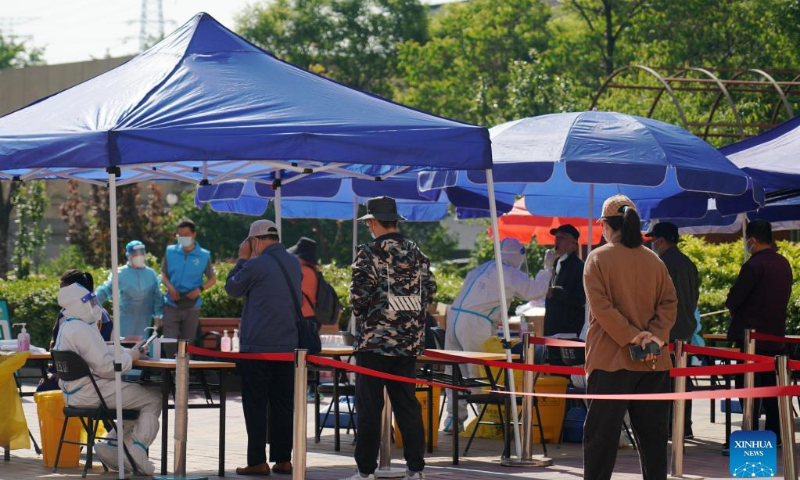
People line up to take nucleic acid tests in Shijingshan District, Beijing, capital of China, May 3, 2022. Beijing's 12 districts have started three rounds of nucleic acid screening from Tuesday till Thursday on a daily basis in succession to curb the COVID-19 resurgence. (Xinhua/Zhang Chenlin)
A Beijing resident who concealed his living address during a COVID-19 epidemiological investigation has led to the spread of the virus and the subsequent closed-off management of more than 1,300 people, Beijing police announced at a briefing on Saturday.
The man surnamed Su, 59, rented and lived in a farming compound in Beijing's Fangshan district and sublet the compound to 25 other residents. He tested positive for COVID-19 on April 27. Fearing that the entire compound would be sealed, he falsely stated during the epidemiological investigation that he was living alone at another location. It wasn't until another resident of the compound also tested positive that Su admitted his true residence and the rental situation, said Pan Xuhong, a deputy director of the Beijing Public Security Bureau.
According to police, the spread of the epidemic was caused by Su's deliberate concealment of his actual place of residence and travel trajectory, which led to a lack of timely and effective control of the associated risk points and personnel. As of Saturday, the number of confirmed cases associated with him had reached 29, and 860 households and more than 1,300 people in Doudian township have been temporarily locked down. Su has been criminally investigated by the Fangshan police.
In addition, a patient in Chaoyang district concealed her visit to a business center during the epidemiological investigation, resulting in her not being promptly included in the control of persons at risk of COVID-19. The police have filed a case against her, Pan said.
Pan stressed that it is everyone's responsibility and obligation to actively cooperate with the tracking investigation to retrace the sources, and concealing and misreporting one's travel trajectory will imply legal responsibility.
Since April 22, Beijing police have handled 127 criminal and administrative cases related to the epidemic, taking criminal compulsory measures for 27 people and administrative detention for 129 people.
Global Times




